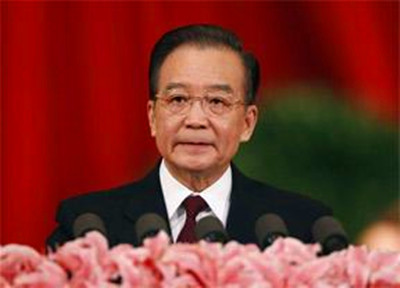(单词翻译:单击)

中央人民广播电台记者:总理,您好。刚才那位外国同行也提到中国的房价,您也阐述了我们调控房价的三方面政策措施。其实从去年开始,国务院就出台了不少关于调控房地产的政策措施,被称为历史上“最严厉的房地产调控”。今年您在政府工作报告当中也重申,要坚定不移地搞好房地产调控。现在社会上有担心,就是这些政策措施能不能落实到位?会不会半途而废?请问总理,您怎么看待这个问题?
China National Radio: Just now my foreign colleague raised the issue of rising housing prices, and you mentioned the three policy measures that the government has taken to control housing prices. We have seen that since last year, the State Council has introduced a succession of measures to bring down housing prices, and some view these measures as the harshest ever. You reiterated in the government work report that the government will resolutely regulate the real estate market. Will these measures be fully implemented, or will the government give up halfway in their implementation?
温家宝:关于房价的调控,我觉得当前最重要的是各项政策措施的落实。对于中央来讲,就是要加强对地方落实房价调控政策的检查力度,真正实行问责制。同时,密切跟踪和分析房地产市场发展的形势,进一步研究有针对性的宏观调控措施。对地方来讲,就是要认真落实房地产调控的责任。比如,首先要公布政府调控房地产的政策和房价控制目标。在这里,我想特别提出,我们三管齐下,其实还有一项非常重要的措施,那就是加快保障性住房建设。也就是说从供求上解决房地产市场存在的问题。对于保障性住房建设,人民群众中有许多担心,他们总的是赞成的,但也有许多忧虑。我们提出,今年再开工建设保障性住房1000万套,明年再建1000万套,在今后五年建设3600万套。保障性住房除了棚户区改造以外,主要是公租房和廉租房,这个方向必须明确。这里就有一个资金落实的问题,中央今年将向地方补助1030亿元,地方财政也相应加大投入,但还必须更广泛地利用社会资金。对于保障性住房,土地供应必须单列,做到应保尽保。有一件事情非常重要,现在就应该提到日程上来,那就是保障性住房的设计、建设必须有高标准、高要求,也就是说要确保质量、安全和环保。特别是在环保上,从设计到建设整个过程,都要实行节能。这是中国房地产建设的一大机会,如果丢掉了,十分可惜。我在这里想强调一点,就是对于保障性住房建设以后,管理和退出机制现在就要着手制定规则,形成一个完整的从建设到管理、退出的机制,使保障性住房质量和效益得到保证,使保障性住房将来的管理也得到保证。
Premier Wen Jiabao: On controlling rising housing prices, what's essential now is to ensure the full implementation of relevant policies and measures. The central government will step up its inspection of the work of local governments. We must implement an accountability system in real earnest. At the same time, we will follow closely and analyze new developments in the real estate market, and study targeted macro-control measures in this field. The local governments must conscientiously perform their relevant responsibilities. For example, they must release policies on regulating the property market and targets for controlling housing prices. Actually, in regulating the real estate market, we have adopted another very important measure. That is, we will further increase the supply of government-subsidized housing units. This means that we will try to address problems in the housing market by increasing supply. With respect to the government-subsidized housing, the people are generally supportive of our policies, though they have also voiced quite some concerns. I would like to say that we have set the target of building 10 million such housing units this year and another 10 million next year. In total, we plan to build 36 million government-subsidized housing units in the next five years. In addition to renovated houses in run-down areas, they mainly comprise public rental housing and low-rent housing. It is essential that we ensure sufficient funding for the construction of those houses. As far as the funding is concerned, the central government will transfer a total of 103 billion RMB yuan in subsidies to local governments this year. Local governments will also increase their fiscal input. We also need to make greater use of non-government capital. It is important that we designate specific sites for the construction of government-subsidized housing and ensure that such designated sites will be used only for this purpose. We need to ensure that the design and construction of those houses will meet high quality standards and will be safe, environment-friendly and energy-efficient. I believe this presents a great opportunity for property development in China. And we must not miss this opportunity. I want to emphasize that we must start now to formulate the management and return mechanisms of the low-income housing and put in place a complete system governing the construction, management and return of these houses to ensure the quality and efficiency and proper management.


